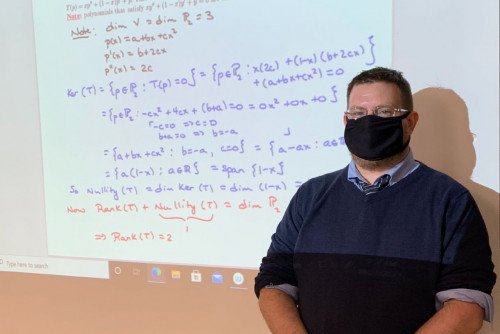
By Tevye J. Schmidt
“I keep coming back to a line by Captain Kirk in Star Trek V: ‘it was there,’” stated Dr. Nicholas Wintz, Associate Professor of Mathematics at the College of Science, Technology, and Health at Lindenwood University regarding his inspiration for working on dynamic equations on time scales. The subject is incredibly dense and is also a new area of study. Because of this, there are many questions that still need to be answered and plenty of opportunities for undergraduate researchers to contribute to the field. Wintz himself has taken an active role in guiding undergraduates' research, saying that he prefers to center projects around the passions of student researchers.
Wintz has had 16 undergraduate researchers since coming to Lindenwood, and their projects have ranged in focus from finance to wrestling. “This ensures students are invested right off the bat. Then it’s just a matter of finding an interesting model and making something happen.” Seeing students tie their mathematical learning to their outside interests is always satisfying, and Wintz reported that he has had several students go into both industry and graduate study in areas related to their undergraduate research at Lindenwood. He also mentioned that “[he’s] always looking to add new students into [his] research program.”
The field of dynamic equations on time scales has only been around since the late 1980s, and Wintz described it as the study of “equations of motion that can have continuous or discrete measurements, or something in between." It is a field with many practical applications in population dynamics, electrical engineering, finance, and more, because it is a way to generate models “that would not have existed in a purely continuous or discrete form.” Wintz clarified that his focus is on applications in optimal control: “We look for an optimal input in our process that minimizes some cost. For example, if we are modeling the dynamics of a drone, we would like to minimize how much battery life is being drained while in flight.”
Wintz mentioned that being at Lindenwood has been great for his research because “the most necessary ingredient to successful research is time.” According to Wintz, receiving course releases over the past few years has made his publications possible, and he has more projects in their preliminary stages currently on the way. Another way to get past time constraints, explained Wintz, is collaboration. For example, Wintz’s research group recently submitted a paper on matrix hypergeometric functions: “This group includes Dr. David Grow (Missouri S&T) and Dr. Tom Cuchta (Fairmont State University).” Their recent paper is a follow-up to another that the group wrote, “Divergence Criteria for Matrix Generalized Hypergeometric Series,” which was accepted in August 2021 for publication.

The Linden Gold
The Linden Gold is a student operated organization focusing on promoting the academic success and achievements of Lindenwood. Through stories about alumni, current students, and faculty alike, The Linden Gold strives to engage with the St. Charles Community and showcase the unique greatness of Lindenwood.












